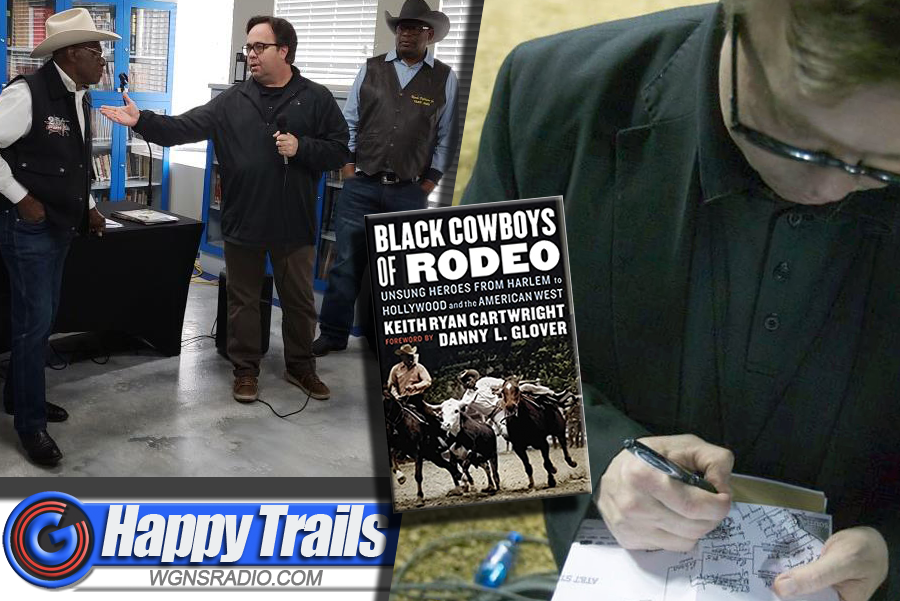Keith Ryan Cartwright has spent the past five years helping to tell the stories of Rutherford County Schools. After recently publishing a highly regarded book about the untold history of black cowboys, Cartwright is departing the school district to focus on promoting the book and other projects...
By JAMES EVANS
If you were to ask Keith Ryan Cartwright what he does for a living, he would — without hesitation — say he is a professional storyteller.
He prides himself on talking and learning about the human element. And regardless of the topic or the industry in which he is covering through his many writings and profiles, his top priority is putting a face on the story.
For more than five years, Cartwright has been helping tell the stories of those who make up Rutherford County Schools. He’s written features ranging from students in robotics competitions, school librarians, hardworking teachers and award-winning academic programs.
He’s now departing the school district after publishing a book about the little-known history of black cowboys. The book — Black Cowboys of Rodeo: Unsung Heroes from Harlem to Hollywood and the American West — officially published in November to rave reviews and praise.
Cartwright grew up in Oshkosh, Wisconsin, where his mom, Kathy, still lives. And his gift of gab has always been evident, she said, with a slight giggle.
“I don't know about storyteller, but yeah, he was a talker,” his mother said of Cartwright’s childhood.
“A couple of my brothers would take him a few times and they went to a baseball game,” Kathy said, “and he talked all the way there. They'd reach over and turn the radio up a little bit and he talked louder. And he says, ‘I knew what they were doing, mom — I just spoke over the radio.’”
Some may wonder how Cartwright ended up in Tennessee writing about schools, much less cowboys.
While the explanation is long and winding, the simple version is that Cartwright moved to Murfreesboro to earn a journalism degree at Middle Tennessee State University, where he eventually became a sports editor at the student newspaper and a staff writer in the sports information department.
After graduation, he continued telling stories, and he became a regular freelancer for several publications in Middle Tennessee and beyond. Over the years he’s interviewed country singers and movie stars, professional athletes, former U.S. president and Vice President.
In addition to writing for print publications, he also worked as a writer and producer in television.
But it was a chance encounter in 2007 that would thrust him into the world of bull-riding and eventually become an expert on the history of rodeo and black cowboys.
Cartwright has a love of baseball and aspired to be a beat writer covering a Major League club. He met with a friend who was a MLB.com editor, who suggested that Cartwright cover another sport for a while to prove he could do it.
It was that friend who, only a few weeks later, heard about an opening for a writer with Professional Bull Riders Inc., and he recommended Cartwright, who did a phone interview soon thereafter.
He didn’t know much about the sport — other than what he had learned through Google — but he knew how to find stories and write about people. It was that attitude and approach that landed him the job.
Cartwright initially intended to only stay for a year or two so he could gain enough experience to be considered for a baseball writing position. But he soon realized that he would never have the same level of access to the athletes — and thereby not be able to find the types of stories he liked to tell.
“I realized how fortunate I was at the PBR and so I stayed for the next seven years, and during that time, it eventually led to this book,” Cartwright said.
He became an expert on the sport and also met a man who would change the trajectory of his career.
The man was Myrtis Dightman, the first African-American to qualify for the National Finals Rodeo.
Myrtis had little education — he attended school inconsistently through the fifth-grade while also learning to work on a ranch — but Cartwright was enamored. He knew immediately that he wanted to write a biography about Myrtis.
“If you talk to him, he’s got a lot of wisdom to share,” Cartwright said. “You don’t feel like you are talking to someone who never really went to school on a regular basis. That was fascinating to me. Myrtis became — he is my hero.”
Through Myrtis and his own stories, Cartwright soon learned that there were other black cowboys whose tales needed to be told.
Hence, the seeds for the book were planted.
Keith later left the PBR to pursue and earn a master’s degree from Harvard University, and then he found his way back to Murfreesboro when he joined Rutherford County Schools in 2016 as a communications specialist.
A product of public schools, Cartwright said he saw the role as a way of giving back and to show his appreciation for his first grade teacher, Sarah Mathewson, whom he stills talks with on a regular basis.
You see, Cartwright and eight other students had been held back in the first grade, but Mathewson was his second first-grade teacher. She encouraged and supported him, and the love she showed helped Cartwright overcome the setback and learn to enjoy school again.
“She thinks I overemphasize it … but she saved my life,” Cartwright said.
During his time serving the school district, Cartwright also moonlighted his book project, which he officially started July 1, 2017. It went through many edits and additions, but now published, it consists of 38 chapters, each illustrating a unique story from the world of black rodeo. It also includes a foreword from actor and activist Danny Glover.
While his mom may not have foreseen his love of talking would one day blossom into a full-fledged career as a storyteller about cowboys, she never doubted his talent.
“I always told him I knew he could do it,” Kathy said. “I’m amazed at it, but I’m not surprised.”
Black Cowboys of Rodeo: Unsung Heroes from Harlem to Hollywood and the American West, is available everywhere books are sold.






